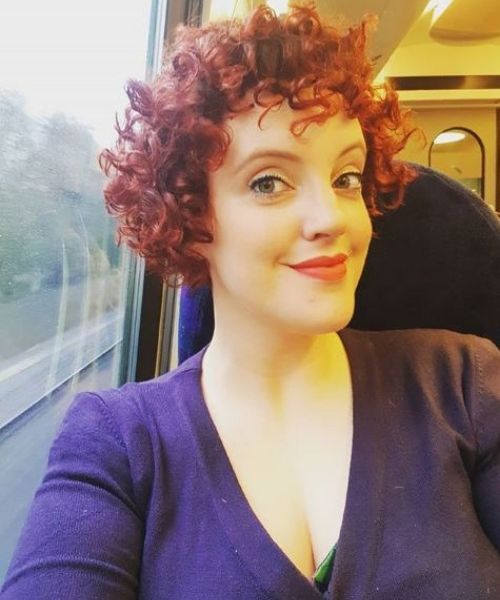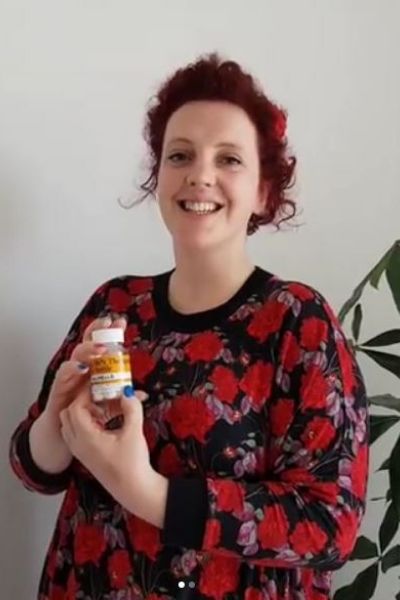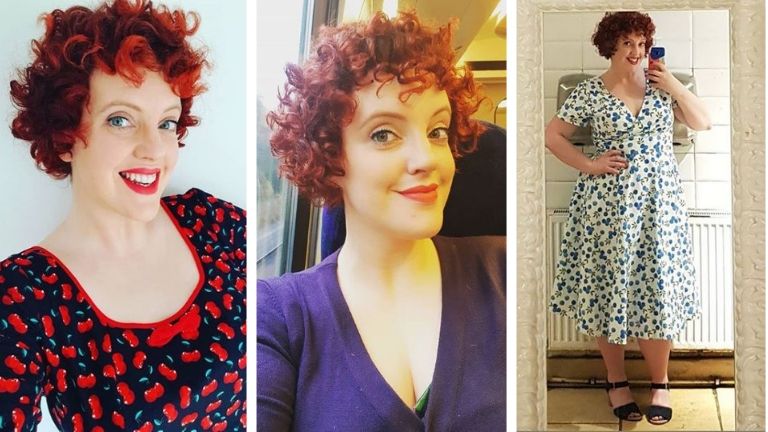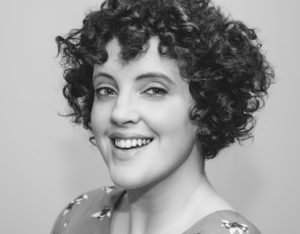Antidepressants helped Michelle Thomas overcome crippling depression four years ago, and she is not coming off them – here’s why
Four years ago, I began taking antidepressants for the first time. It was about 18 months after my first major depressive episode, and I still didn’t feel like myself. I’d tried counselling (let’s just say it inspired the title of my book, My Sh*t Therapist). I was eating well. I’d even started *shudder* running. But I still couldn’t bring my black dog to heel. It was time to consider medication.
I went to see my GP and asked for something to ‘take the edge off ’. I thought I could take a little helper as and when I needed it. Feeling anxious? Just pop a little pill, and POOF. No more mads.
But no. While that’s a crude analogy for how some anti- anxiety medications work (like diazepam, for example), those types of medication are generally prescribed for a short period. I needed something more long-term, which I’d take every day for a cumulative effect.
I was so desperate for something, anything…but the first few days were monstrous
My GP recommended a type of antidepressant called an SSRI (selective serotonin reuptake inhibitor) that I’d have to take every day for up to three weeks before they had an effect. By that time, I was so desperate for something, anything, that I agreed to start on 10mg a day of citalopram.
I got my prescription and marched straight from the surgery to the chemist. While starting a chemical-altering medication doesn’t necessarily call for celebration, I was optimistic, almost excited.
The first few days were monstrous.
I was working in the train station cafe at the time. It was always full of mums with prams, dog walkers and hungover visitors desperate to smother their despair with chunks of sourdough bread and bacon fat.

It took a while to kick in
I’d been taking the medication for about three days, with no ill effect, but one morning I felt… wrong. It’s hard to describe. There was no nausea, no headache, no physical symptoms at all. It simply felt like someone had turned up the volume and brightness of the world. Everything felt close, and loud, and my movements were slow and clumsy. I spilt a 3kg bag of ice which scattered across the kitchen floor. I broke a mug. I mis-poured coffee beans into the grinder and sent them racing across the worktop. I cut my fingers. I didn’t eat. I barely spoke as I doggedly arranged and rearranged cans of Perrier and cartons of coconut water. I drank herbal tea (the phrase ‘herbal tea’ irritates me so much. All tea is herbal. Tea is a herb).
Depression is the most horribly isolating thing, a smudged screen between me and the world. I couldn’t quite meet the eyes of my colleagues or customers, so I chained myself to the coffee machine, where I spent my shift steaming milk and grinding beans. I kept my eyes down and cowered behind the enormous steel beast. Each stranger who approached the counter to collect their coffee was a threat, each cheery ‘Thanks!’ as I handed over chai or Earl Grey or Americano was imbued with menace.
Finally, mercifully, my shift ended. I staggered home and climbed straight into bed, barely able to say a word to my long- suffering partner. I don’t think I’d ever slept as much, or as badly, as I did over the next few weeks. I never felt rested, just varying levels of jangling anxiety.
Medication made a world of difference
When I’d been on the medication for about four months, I slept through my 5:30am alarm. My boss rang me 20 minutes after I should have been at work. I leapt out of bed, ran to the cafe, apologised, set up and was ready and open for my first customers by 6:30am.
Six hours later, at the end of my shift, it occurred to me – I hadn’t thought about my morning once. In the past, I would have torn strips off myself for making such a stupid mistake. But not that day. It had happened. I’d apologised to my boss, who was fine with it. And I’d got on with my day, without second-, third-, fourth-guessing every decision I made.
That’s the difference the drugs make. They reduce the anxiety, so that you can get on with your life without a constant assault of intrusive, worrying thoughts. And they still do, for me.
That’s not to say that I’ll be on drugs forever. I might be, of course, but that’s not a decision I have to make right now. And the truth is, I’m terrified of the withdrawal if and when I do stop taking them.

What happens if you stop taking your pills?
After I’d been on medication for three years, I ran out of pills. I kept meaning to reorder, but when I realised I was down to the last handful it occurred to me that I could just… not reorder them. See how I coped without them.
I’d been having nagging doubts about whether or not I really needed them, whether or not they were a placebo, a crutch, and whether they might actually be a barrier to my full recovery from my mental illness. What if I was becoming reliant on medication I didn’t need? I was feeling so much better than I had when I started taking them.
I’d made massive structural changes in my life to remove what I perceived as the cause of my depression – a stressful, low-paid job – while the medication helped me manage the symptoms.
I’d moved to Bristol – London’s friendlier, more chilled-out cousin in the West Country. I was exercising and eating fairly well. I was aware of my triggers and had a fairly good idea of how to look after my mental health.
Naturally, I didn’t want to take medication if I didn’t need to. And I couldn’t find out whether or not I needed it without doing without it for a while.
Maybe now was the right time to try that. So, without going to see my GP to get medical advice, I eked the pills out, tapering off to half a pill every other day, then nothing.
Please, please don’t stop taking your meds without medical supervision, like I did. I was a naughty idiot. Always speak to your doctor first.
Very soon, this proved to be a terrible idea. A really dangerous, stupid, ill-informed, uncontrolled decision that was a threat to my stability and safety. Please, please don’t stop taking your meds without medical supervision, like I did. I was a naughty idiot. Always speak to your doctor first.
The first week was a horror show. Withdrawal impacted my spatial awareness – I’d often misjudge my step and walk into door frames, and my movements felt dopey and cumbersome.
At my pub job, I pulled pints seemingly in slow motion, and always, always overpoured. I’d walk the floor, collecting glasses, serving food, feeling like a ghost, floating just a few inches outside my body. I put down plates extremely slowly to make sure that I didn’t miss the table. There was a lot of tripping up over my suddenly-too-big feet.
I’ve since learned that this feeling of being disconnected from your body is called dissociation, and it’s usually associated with profound trauma. Which I haven’t endured. I’m just lucky, I guess.
A week later I was in the passenger seat of my boyfriend’s car. Traffic was heavy – rush hour on a white-hot Saturday, and day-trippers were returning from the beaches of Portishead and Weston-super-Mare and Clevedon to the beer gardens of Bristol’s city centre.
The temperature soared in the late afternoon sun. I felt feverish and nauseous. Anxiety began to writhe in my belly.
As soon as the word ‘panic’ fluttered into my consciousness, the attack was upon me.
I seized up in my seat as my adrenaline surged. Every working component of my brain was overloaded and overwhelmed, everything felt bigger and louder and closer and more dangerous than it had seconds before.
A car in the opposite lane appeared to lurch into ours before passing us by. So did the next one. And the next. And the next. In my skewed and anxious state, it seemed that every single car that passed was careering towards us.
I begged my boyfriend to stop the car.
‘I can’t,’ he said, pained. ‘There’s nowhere to stop.’
We can’t have been doing more than 50 in a 60-miles-per hour zone, but it felt like we were on black ice, out of control, speeding towards certain death.
For 40 agonising minutes, I crawled inside my skin, flinching as hundreds of tonnes of metal skimmed passed us.
And yes, logically, rationally, I knew that there was no threat. But my powerful irrational brain believed that there was, and that disconnection made me feel like I was insane.
Eventually, my bewildered man pulled over in a residential area marked by the vibrant street art that makes Bristol the city it is. I loved, and still love, the painted streets of my adopted home city, but today the acid-laced swirls and violent slashes of colour elevated my unease, and I cried myself breathless.
After a few more days of horrifying symptoms, I phoned my local surgery, and was put through to the triage doctor immediately.
‘I came off my medication two weeks ago,’ I explained snottily. ‘And I still feel awful.’
I explained what I’d done and what had happened. It’s embarrassing, but I was scared to tell her what I’d done. I knew it was stupid, but even the gentlest telling-off would shatter me into a million pieces. But she was very calming and very kind, and suggested the single most helpful thing that would make me feel better.
‘OK,’ she said. ‘How would you feel about going back on the medication?’
‘Oh God, yes please,’ I begged, weak with gratitude.
‘I think that’s a good idea. Your prescription will be ready in a couple of hours.’
Feeling right again
After a few days back on the meds, I felt my crooked brain click neatly back into place. I felt my floating-ghost self align with my physical self – no more bumping into door frames, no more spilling pints. I felt ‘right’ again.
Recent studies have shown that the drugs do work – antidepressants are more effective than a placebo. But even if these studies had been inconclusive, I think I’d still take them.
If, when I became ill, I could have taken six months off work and immediately started talking therapy on the NHS, if I lived in a culture where mental health was given the same priority as physical health, would I have had a breakdown? Would I have needed to take medication? Perhaps not.
But opting out of work, of earning, of paying bills, of socialising, of living your life for months and months simply isn’t possible for most people. So how else do we navigate life when we’re not managing?
The truth is that even if I never fall properly ill again, there will always be a part of me that fears Going Mad (and please, universe, if you’re reading this, don’t let me go mad again. Let me break every bone in my hands and feet, but please don’t touch my brain).
I don’t feel truly in control of my brain and I know that it could throw a major wobbly at any point in the future. So, to minimise the likelihood of this happening, I keep taking the meds.
Michelle Thomas is the author of new book My Sh*t Therapist: and Other Mental Health Stories.
Follow Michelle on Instagram: @msmthomas
Michelle Thomas made international headlines in 2015 when she wrote a blog post in response to a fat-shaming text message. The post went viral, reaching 500,000 readers and sparking numerous conversations about body confidence, sexism, and dating apps.
Michelle has worked extensively in theatre and production roles but ever since that clap-back classic, it is her writing career that has taken centre stage. Michelle has written for the Independent and Stylist, among other publications. Her specialist subjects are feminism, body image, mental illness, and dating, but her 22k Instagram followers are also familiar with her terrible cooking, her good and bad hair days, and her on/off relationship with fitness.
More Healthista content:
8 ways walking can help depression and anxiety – the psychotherapist’s guide
How to relieve stress and anxiety with foot reflexology
This 10-minute meditation for depression will lift your mood fast
Mental health fixes – 13 women share what makes them happy
Like this article? Sign up to our newsletter to get more articles like this delivered straight to your inbox.






















































